-
 bitcoin
bitcoin $112195.049338 USD
2.42% -
 ethereum
ethereum $4124.915858 USD
2.81% -
 tether
tether $1.000570 USD
0.02% -
 xrp
xrp $2.861568 USD
2.25% -
 bnb
bnb $1000.346670 USD
3.04% -
 solana
solana $209.070819 USD
3.38% -
 usd-coin
usd-coin $0.999870 USD
0.02% -
 dogecoin
dogecoin $0.235379 USD
2.65% -
 tron
tron $0.335681 USD
-0.20% -
 cardano
cardano $0.803501 USD
3.38% -
 hyperliquid
hyperliquid $47.120881 USD
3.56% -
 chainlink
chainlink $21.501300 USD
3.44% -
 ethena-usde
ethena-usde $1.000571 USD
0.02% -
 avalanche
avalanche $29.793378 USD
3.62% -
 stellar
stellar $0.366964 USD
2.42%
Is currency speculation a leverage transaction or a contract transaction?
Currency speculation involves leverage transactions, which magnify potential returns through borrowed funds, and contract transactions, such as forwards and futures, that provide price risk management and flexibility.
Dec 16, 2024 at 12:10 pm
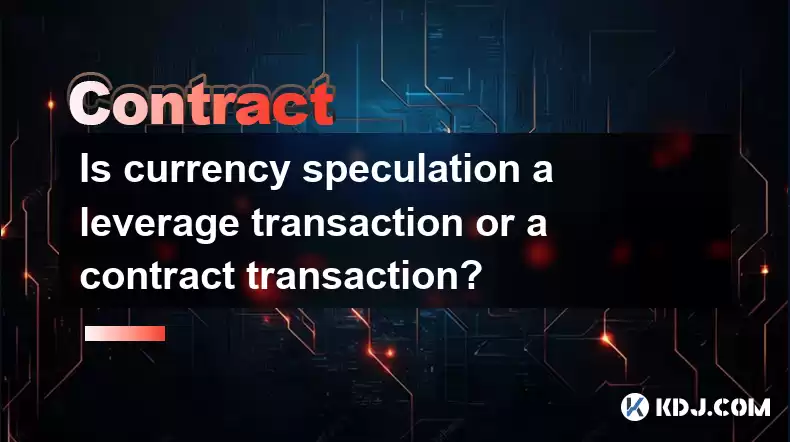
Currency speculation is a multifaceted concept that can be executed through various financial instruments and strategies. Understanding the nature of currency speculation requires a clear distinction between leverage transactions and contract transactions. This exploration will delve into the intricacies of each approach, unraveling the key characteristics, advantages, and potential risks associated with each.
Leverage Transactions- Concept:Leverage transactions amplify the impact of trading capital by utilizing borrowed funds. Traders borrow capital from a broker or other lending institution to increase their purchasing power and magnify potential returns.
- Advantages:
- Increased Potential Returns: Leverage enhances profit potential by enabling traders to control a larger position size with a smaller initial investment.
- Reduced Capital Requirements: Leverage allows traders to participate in currency trading with limited available capital, making it accessible to a wider range of investors.
- Risks:
- Increased Loss Potential: Leverage works both ways. Not only does it amplify potential profits, but it also magnifies potential losses.
- Margin Calls: If the trader's account balance falls below a certain level, the broker may issue a margin call, requiring the trader to deposit additional funds or close the position.
- Volatility Risk: Leverage can exacerbate volatility in both directions, leading to rapid fluctuations in account value.
- Concept:Contract transactions involve entering into agreements to buy or sell a specific currency at a predetermined price and date. These contracts are standardized and traded on exchanges or over-the-counter (OTC) markets.
- Types of Contracts:
- Forwards: Forward contracts are customized agreements between two parties to exchange a specific currency at a predetermined price and date in the future.
- Futures: Futures contracts are standardized contracts traded on exchanges, obligating buyers and sellers to exchange a specific currency at a predetermined price and date.
- Options: Options contracts grant buyers the right, but not the obligation, to buy or sell a specific currency at a predetermined price within a specified time frame.
- Advantages:
- Price Risk Management: Contracts provide a mechanism for locking in exchange rates and mitigating price risk over time.
- Flexibility: Options contracts offer flexibility by allowing buyers to adjust their positions or expire the contracts based on market conditions.
- Leverage (in some cases): While leverage is not inherent in all contract transactions, some exchange-traded futures and options provide leverage, allowing traders to control a larger position size than their initial investment.
- Risks:
- Limited Upside Potential: Unlike leverage transactions, contract transactions typically limit potential profits to the appreciation of the underlying currency.
- Time Decay (for options): Option contracts lose value over time, irrespective of underlying price fluctuations, as they approach their expiration date.
- Counterparty Risk: Contracts involve the risk of the other party failing to fulfill their obligations, potentially resulting in financial losses.
The choice between leverage transactions and contract transactions depends on the trader's individual objectives, risk tolerance, and investment horizon. Here are some key factors to consider:
- Risk Appetite: Leverage transactions are riskier due to the potential for magnified losses. Traders with high risk tolerance may consider leverage to enhance returns, while those with low risk tolerance may favor contract transactions.
- Investment Horizon: Leverage transactions are typically better suited for short-term trading strategies, while contract transactions can provide flexibility for both short-term and long-term strategies.
- Market Volatility: Leverage can accentuate volatility, making it a less desirable option in highly volatile market conditions. Contract transactions may offer more stability during volatile periods.
Disclaimer:info@kdj.com
The information provided is not trading advice. kdj.com does not assume any responsibility for any investments made based on the information provided in this article. Cryptocurrencies are highly volatile and it is highly recommended that you invest with caution after thorough research!
If you believe that the content used on this website infringes your copyright, please contact us immediately (info@kdj.com) and we will delete it promptly.
- SWIFT, Consensys, and Blockchain Settlement: A New Era for Global Finance?
- 2025-09-30 06:25:13
- Gold Dollar Coin, Mystery, Upright 5: Unearthing Hidden History and Whale-Sized Speculation
- 2025-09-30 06:25:13
- Meme Coins, Smart Money, 2025 Riches: Navigating the Hype
- 2025-09-30 06:30:01
- VeChain (VET) Price Prediction 2026: Bullish Breakout or Enterprise Stalemate?
- 2025-09-30 06:30:01
- BetFi Coin: Is This the Next High-ROI Crypto Presale?
- 2025-09-30 06:30:01
- Bitcoin, Nvidia, and the Potential Upside: Lessons from the AI Boom
- 2025-09-30 06:30:15
Related knowledge
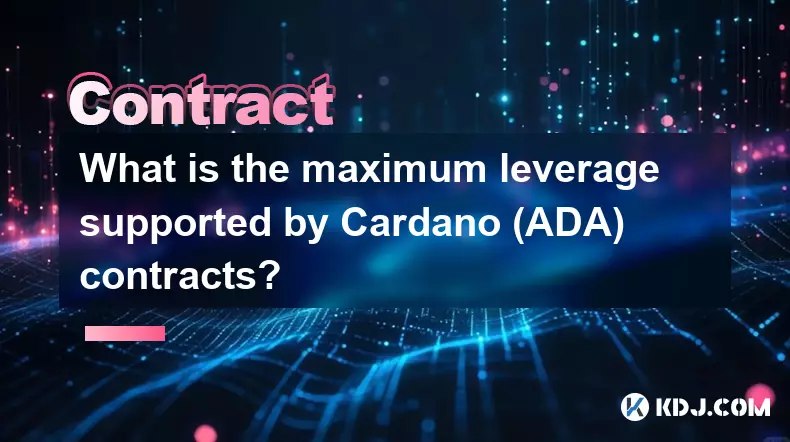
What is the maximum leverage supported by Cardano (ADA) contracts?
Sep 30,2025 at 03:37am
Understanding Leverage in ADA Derivatives Trading1. Leverage in cryptocurrency futures and perpetual contracts allows traders to control larger positi...
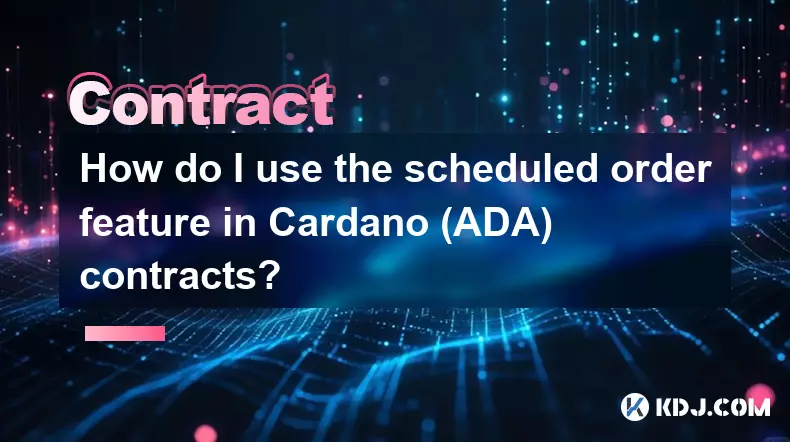
How do I use the scheduled order feature in Cardano (ADA) contracts?
Sep 28,2025 at 10:18pm
Understanding Scheduled Orders in Cardano Smart ContractsCardano operates on a proof-of-stakes consensus mechanism and uses the Plutus scripting langu...
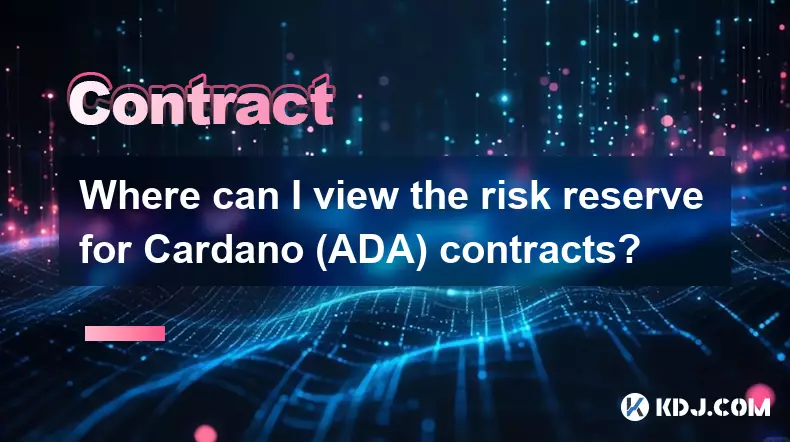
Where can I view the risk reserve for Cardano (ADA) contracts?
Sep 29,2025 at 09:19pm
Risk Reserve Overview in Cardano (ADA) Ecosystem1. The concept of a risk reserve within the Cardano blockchain does not align with traditional central...

How do I enable the "scalping-only" mode for Cardano (ADA) contracts?
Sep 24,2025 at 03:19am
Understanding Scalping Strategies in Crypto Derivatives1. Scalping in cryptocurrency trading refers to executing multiple short-term trades within min...
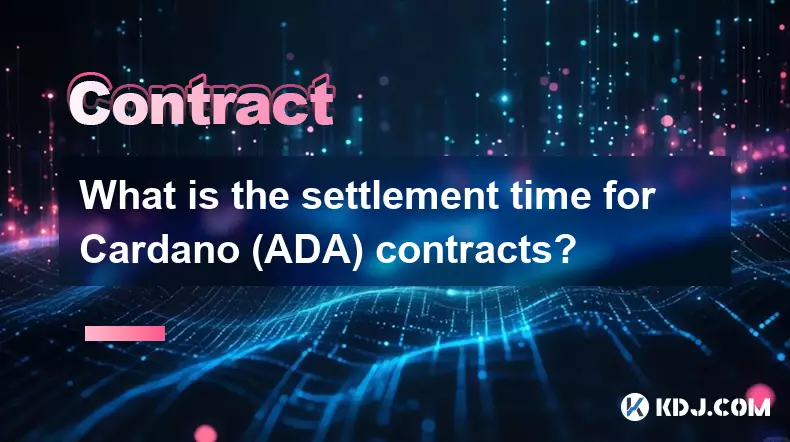
What is the settlement time for Cardano (ADA) contracts?
Sep 28,2025 at 04:18am
Understanding Cardano's Contract Settlement Mechanism1. Cardano operates on a proof-of-stake consensus model known as Ouroboros, which fundamentally i...
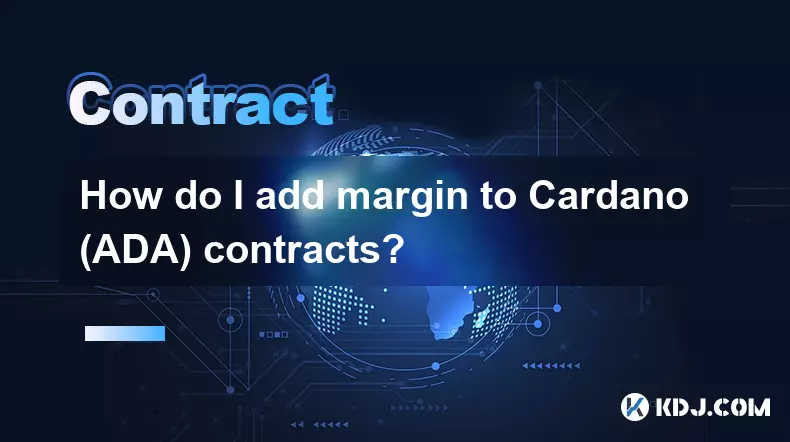
How do I add margin to Cardano (ADA) contracts?
Sep 27,2025 at 07:54pm
Understanding Margin in Cardano (ADA) Smart ContractsCardano operates on a proof-of-stake blockchain that supports smart contracts through its Plutus ...

What is the maximum leverage supported by Cardano (ADA) contracts?
Sep 30,2025 at 03:37am
Understanding Leverage in ADA Derivatives Trading1. Leverage in cryptocurrency futures and perpetual contracts allows traders to control larger positi...

How do I use the scheduled order feature in Cardano (ADA) contracts?
Sep 28,2025 at 10:18pm
Understanding Scheduled Orders in Cardano Smart ContractsCardano operates on a proof-of-stakes consensus mechanism and uses the Plutus scripting langu...

Where can I view the risk reserve for Cardano (ADA) contracts?
Sep 29,2025 at 09:19pm
Risk Reserve Overview in Cardano (ADA) Ecosystem1. The concept of a risk reserve within the Cardano blockchain does not align with traditional central...

How do I enable the "scalping-only" mode for Cardano (ADA) contracts?
Sep 24,2025 at 03:19am
Understanding Scalping Strategies in Crypto Derivatives1. Scalping in cryptocurrency trading refers to executing multiple short-term trades within min...

What is the settlement time for Cardano (ADA) contracts?
Sep 28,2025 at 04:18am
Understanding Cardano's Contract Settlement Mechanism1. Cardano operates on a proof-of-stake consensus model known as Ouroboros, which fundamentally i...

How do I add margin to Cardano (ADA) contracts?
Sep 27,2025 at 07:54pm
Understanding Margin in Cardano (ADA) Smart ContractsCardano operates on a proof-of-stake blockchain that supports smart contracts through its Plutus ...
See all articles


























![[Pycoin] PI Coin -Shocking Listance of Pycoin?! 'Rebellion' This time ... Pay attention to #paikoin [Pycoin] PI Coin -Shocking Listance of Pycoin?! 'Rebellion' This time ... Pay attention to #paikoin](/uploads/2025/09/29/cryptocurrencies-news/videos/pycoin-pi-coin-shocking-listance-pycoin-rebellion-time-pay-attention-paikoin/68da82f23cec1_image_500_375.webp)















































